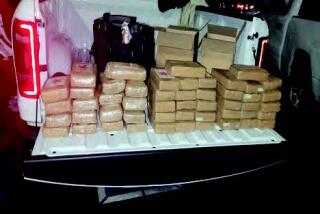Court cases shed light on money-transferring system
- Share via
Reporting from New York — To his defenders, Mahmoud Reza Banki is the accomplished son of Iranian American parents, with degrees from UC Berkeley and Princeton and a business acumen that made him the logical person in the family to trust with more than $3 million.
“My family is unusually generous to me, certainly beyond what is customary among U.S. families,” Banki, 33, told federal authorities after they asked about the hundreds of thousands of dollars dropping into his bank account. Banki said the money came from his cousin Ali in Tehran.
But when agents raided Banki’s $2.4-million Greenwich Village apartment in January, they say evidence indicated that the money wasn’t from rich cousin Ali but from customers around the world who wanted to send cash to Iran. Banki made sure the right amount got to the intended recipients in the Islamic republic via a money-transferring system known as a hawala, prosecutors allege.
As Banki’s trial unfolds in New York, it is highlighting the difficulty the U.S. government faces as it tries to manage hawala operations, which are legal if licensed but which, because of their informal setups, can be tools for other activities such as dodging sanctions against Iran and, according to investigators, funding Faisal Shahzad’s self-admitted bomb plot on Times Square.
“They’re designed to be secretive, and they’re designed to have very little paperwork involved. The record-keeping they do keep could be in another language,” said Stephen Hudak of the U.S. Treasury Department’s Financial Crimes Enforcement Network, which relies on bank alerts of suspicious activities to help track suspected illegal hawalas.
The two cases being heard in a Lower Manhattan courthouse have little in common, but hawalas may play a role in both.
Banki was a management consultant with a prestigious Manhattan firm whose lifestyle included an elegant apartment and five-figure credit-card bills.
He is accused of operating an unlicensed money-transmitting business and of violating the United States’ 1995 trade embargo against Iran, charges that prosecutors say could bring more than 20 years in prison.
In court, Banki, who has been held without bond since January, smiles confidently at the jury and casts frequent flirtatious looks at his girlfriend seated on the wooden benches behind him. Last week, a group of Iranian Americans from Los Angeles were among those in court to bolster his confidence.
Shahzad, a 30-year-old Pakistani American, was facing foreclosure and was struggling to support his wife and baby after leaving a low-level job as a financial analyst when he tried to bomb Times Square on May 1, authorities say.
He is suspected of funding his plot with money sent from Pakistan via hawalas. Unlike Banki, who is accused of funneling millions of dollars, Shahzad is believed to have received just enough to buy a used SUV for $1,300, bomb-making materials and a one-way plane ticket out of the country.
Both cases offer a look into the murky, ancient system of moving money across borders.
“There is the potential of great danger when individuals illegally move money internationally without the government’s knowledge, since that money often falls into the hands of individuals who threaten our national security and the security of other nations,” FBI special agent in charge James T. Hayes Jr. said after Banki’s arrest.
According to prosecutors, from January 2006 through September 2009, Banki received about $3.4 million from individuals and companies from Latvia, Slovenia, Russia, Sweden, Saudi Arabia, Kuwait, the Philippines and the United States in his Bank of America account. Banki used a Tehran-based partner to ensure that the intended recipients received the money, minus processing fees, in Iran, the government alleges.
The defense says the partner is actually a licensed broker who simply made sure the family funds reached Banki in New York. They say Banki received money but never sent any to Iran.
Rather than using wire transfers to send money overseas, the hawala system generally relies on a system of trust between far-flung brokers, enabling them to avoid expensive bank transfer fees and to get cash into recipients’ hands rapidly — often within hours.
The system also limits the paper trails that come with formal bank transfers. It is the best way to move money to places such as Somalia, without proper banking systems, and the cheapest method for migrant workers to send cash home to relatives.
“It’s a very good business model,” said Nikos Passas, a criminology professor at Northeastern University and an expert on money-laundering methods.
Passas said the problem the United States faced in trying to manage hawalas, which might operate out of corner groceries, barber shops, dry cleaners or individuals’ apartments, was the fees that states charged people who wanted to operate legally.
“State-level regulation is completely unrealistic,” said Passas, adding that it could cost more than $1 million for someone with clients in New York, New Jersey and Pennsylvania to meet the requirements to operate money-transferring businesses in all three states.
“No corner store trying to help a community send money back home is going to comply with this,” Passas said.
Banki contends he merely invested the funds sent by his cousin and earned through a lucrative family enterprise.
Banki drew a family tree for investigators outlining his extended clan and aiming to explain why so much wealth was coming his way.
“I am the only family member with an advanced degree living abroad and in the United States,” he wrote. “Because of this, for better or worse, I am the source of pride for the extended family.”
Prosecutors, who rested their case May 19, presented witnesses who testified about envelopes filled with cash found in Banki’s apartment, notes indicating amounts to be delivered and computer records with no sign of Banki communicating directly with a cousin Ali about money transfers.
“There is zero proof” the money came from his cousin, said Assistant U.S. Atty. Danya Perry.
When the defense begins presenting its case Tuesday, it plans to air videotaped testimony from Banki’s alleged Iranian hawala partner, who gave his deposition in the Bahamas this month after volcanic ash from Iceland prevented attorneys from meeting him in Turkey.
More to Read
Sign up for Essential California
The most important California stories and recommendations in your inbox every morning.
You may occasionally receive promotional content from the Los Angeles Times.











